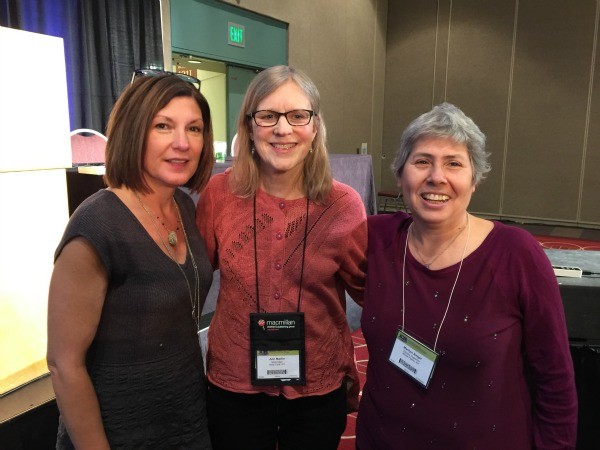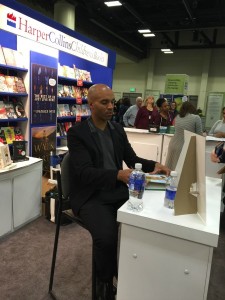Five Reasons Why the 2015 NCTE Conference Was the Best Yet
Two big book award announcements, plus appearances by Kadir Nelson, Chelsea Clinton, Kate DiCamillo, and Kwame Alexander: The annual conference of the National Council of Teachers of English (NCTE) in Minneapolis had all the makings of an event to remember.

Left to right: Candace Fleming, Ann Martin, and Marilyn Singer
What happens when teachers, scholars, authors, illustrators, and publishers converge in Minneapolis for four days? Well, it’s quite a story—a meta-story, actually, about the power that story holds to help us make sense of the human experience. This idea was at the heart of the conversations that shaped the annual conference of the National Council of Teachers of English (NCTE), convened November 19–22, 2015. It turned out to be a stellar conference for five very good reasons.1) A rousing welcome
Welcoming conference goers during the first general session on Thursday night, NCTE’s president-elect and conference chair Douglas Hesse and vice president and 2016 chair Susan Houser presented a poem together. They alternated in reading lines, each one a reason for “Why We Are Here.” The moving performance included reasons such as “Because 105 years from now, teachers will look back on this as a time when teacher knowledge was beginning to matter in board rooms as well as classrooms,” and “Because never has the need to read and write critically been more important.” Next on stage was Chelsea Clinton, who shared the backstory of her new book for young adults, It's Your World: Get informed, Get Inspired, & Get Going! (Penguin Random, a premium sponsor of the conference). Clinton emphasized the key role teachers provide in inspiring and guiding young learners, naming influential teachers in her own life. She brought up a book she read as a child, Fifty Simple Things Kids Can do to Save the Earth (Andrews McMeel, 1990), recalling, “The book treated me like someone who deserved to know what was happening in the world around me…it taught me that I could make a difference." Clinton concluded by offering up her family’s guiding motto, “Always get caught trying.” In the Q&A session that followed, audience members encouraged Clinton to advocate for changes in educational policy that would recognize the unique expertise and influence of teachers.2) Presentations that captivated conference goers
Following the opening call to action, the conference’s hundreds of sessions began to unfold. Authors and illustrators of children’s books presented alongside teachers and professors, sharing the stories of their creative processes. Again and again, there was affirmation that books hold the power to engage children as active learners. Presenters entertained hushed and attentive audiences with stories of their work. Kate DiCamillo described a grandfather who purchased two copies of books, mailed one copy to his granddaughter, then read aloud to her over the phone. DiCamillo said, “They will know each other in ways that will serve them for the rest of their lives, connected by story!” Kwame Alexander urged us to change education by “changing the language we use to identify our young people,” encouraging us to stop framing the lives of children from a deficit-perspective. He reminded us that “reading is like breathing, intellectual breathing and soul breathing. Every kid wants to love reading. It’s about helping them love themselves as readers and connecting them to a world of knowledge and a world of ideas.” Lisa Graff talked about her teachers, including Mr. Clifton, who was terrible at math growing up and hated it as a kid, so “he was going to fight until you understood math.” Speaking about her The Right Word (Eerdmans Books for Young Readers, 2014), Jen Bryant talked about how she writes biographies. “These…people have such enormous lives, but they start with small moments. It’s like mining. I sift and sift and try to find a little gem, and then suddenly the vein widens and [I] find a huge life and I just need to make music out of it all."3) “Stars” were lauded
Two floors down, the exhibit hall hummed with activity. Long lines formed as conference goers sought the autographs of their beloved authors and illustrators. As they signed book after book, they listened graciously and gratefully to reports of “My students love this….”
The line to see author Ruta Sepetys
Two of these esteemed creators were formally recognized at a luncheon with children’s literature awards sponsored by NCTE: the Orbis Pictus Award for Outstanding Nonfiction and the Charlotte Huck Award for Outstanding Fiction for Children. The Orbis Pictus award went to Don Brown for Drowned City: Hurricane Katrina & New Orleans (HMH) and the Huck award to Sharon Draper for Stella by Starlight (Atheneum, both 2015). The full listings of honorees can be accessed on the NCTE website.4) Previous winners inspired and entertained
Several of last year’s award winners spoke at the luncheon. Candice Fleming, who received the Orbis Pictus award for The Family Romanov: Murder, Rebellion, and the Fall of Imperial Russia (Schwartz & Wade, 2014), described her research and writing processes. She highlighted the distinction between narrative and story. “Narrative is chronology, all our lives are narrative, but story is something else. Story is arranging narrative so that it has meaning.” As she dug deep into the history of the Romanov family, Fleming focused on character, challenging herself to reconstruct a typical day for each of her main characters, stating that when she could do that, she knew she was ready to tell the true story. Marilyn Singer, who had been honored for her body of work with the award for Excellence in Poetry, began with song and redemption—literally. She described a time in her childhood when she was too shy to sing in public, but then added, “I’m going to do it now!” And she did, serenading the audience with “Baby Face.” She credited song lyrics with inspiring an early interest in language and professed the emotional power of poetry, describing it as “vital, comforting, notorious, disturbing, scintillating…tickling your brain, serving your spirit.” Ann Martin was the previous recipient of the Huck award for Rain Reign (Feiwel and Friends, 2014). In her speech, she spoke about Rose, a girl on the spectrum, who is the main character of this novel. She said that “creating characters and finding their voices is [her] favorite part of the writing process.” Barbara Kiefer of Ohio State University, chair of the award committee, paid tribute to her mentor, Charlotte Huck, the noted children’s literature and textbook author, noting her lifelong dedication to furthering the field of children’s literature and ensuring that teachers understood children’s books as powerful teaching tools for academic, social, and emotional development. The Huck award “recognizes fiction that has the potential to transform children’s lives by inviting compassion, imagination, and wonder.”5) Kadir Nelson shared his personal influences
The Children’s Literature Assembly breakfast was another highlight of the conference. This affiliate group of NCTE, dedicated to “promot[ing] children's literature as a field of learning, research, and classroom application,” celebrated its 40th anniversary with balloons, beautiful paper lanterns, and the words and images of author/illustrator Kadir Nelson. Audible gasps punctuated Nelson’s remarks as he displayed high-resolution images of his art on the main screen. One particularly powerful image came from Baby Bear (Balzer + Bray, 2014). It shows Baby Bear looking upward, the close up of his face revealing images of the moon reflected in his eyes.
Kadir Nelson autographs copies of his books.
Describing his early career job of storyboarding films, Nelson noted, “I think of each book as if it were a silent film.” Describing his book Heart and Soul: The Story of America and African Americans (Balzer + Bray, 2013), Nelson said, “I think of America as a larger family—all those families have a story—all those stories woven together are the tapestry of America.” The tapestry of the 2015 NCTE conference, with its theme of “Responsibility, Creativity, and the Arts and Language,” tells a story in which the characters are children and teachers, the settings are vibrant classrooms resonant with the words of accomplished authors and illustrators, and the conflict and resolution are determined by teacher and student agency. It is a story that is constantly being rewritten. Erika Thulin Dawes, Ed.D. is associate professor of language and literacy at Lesley University in Cambridge, MA, where she teaches courses in children’s literature and blogs about books at www.classroombookshelf.blogspot.comRELATED
RECOMMENDED
CAREERS
The job outlook in 2030: Librarians will be in demand
CAREERS
The job outlook in 2030: Librarians will be in demand
ALREADY A SUBSCRIBER? LOG IN
We are currently offering this content for free. Sign up now to activate your personal profile, where you can save articles for future viewing






Add Comment :-
Be the first reader to comment.
Comment Policy:
Comment should not be empty !!!